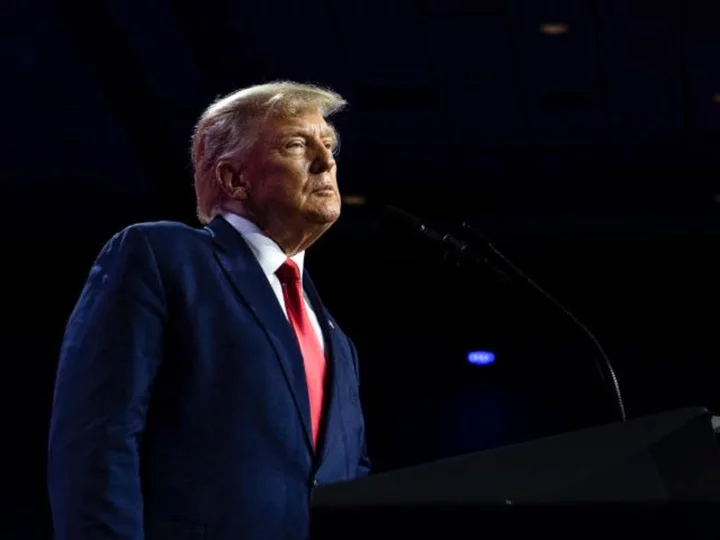
Trump's legal team seeking a meeting with special counsel as federal indictment looms
Donald Trump's legal team is seeking a meeting with special counsel Jack Smith on Thursday, as a potential federal indictment looms, three sources familiar with the matter tell CNN.
2023-07-27 22:24

Michigan Democratic governor signs ban on 'conversion therapy' for minors
Michigan Gov. Gretchen Whitmer has signed two bills banning so-called conversion therapy, a scientifically discredited practice intended to change a person's sexual orientation, for minors in the state, the governor's office announced Wednesday.
2023-07-27 19:54

Israel president urges calm amid plans for further protest at judicial overhaul
By Dan Williams JERUSALEM (Reuters) -Israel's president urged both sides of a dispute over moves to overhaul the judiciary to
2023-07-27 19:15

The 10 Senate seats most likely to flip in 2024
In a presidential contest cycle, Senate races don't get the same kind of attention when there's still a year to go until Election Day. But the start of the second fundraising quarter earlier this month brought a host of new candidate names -- some declared and some still biding their time -- that will help shape the race for control of the chamber in 2024 and the ultimate power dynamics for whoever is president in 2025.
2023-07-27 18:50
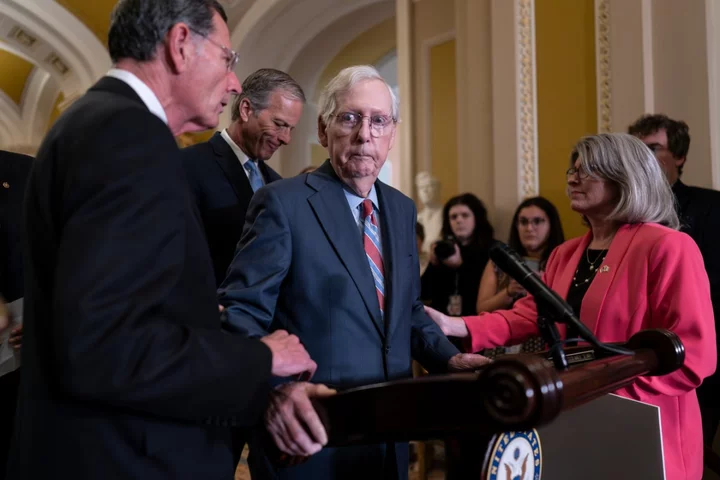
Mitch McConnell’s health history reveals previous issues as he freezes during briefing
Mitch McConnell froze and briefly appeared to be unable to continue speaking during a Senate Republican press conference. He was led away by colleagues and returned not much later, stating that he was “fine”. This is not the first time that the 81-year-old has had a health scare. The scene occurred on Wednesday as Republicans held their last weekly press briefing before the August recess, and discussed remaining business including the chamber’s effort to pass a defence spending bill before the holiday begins. Mr McConnell was seen freezing at the podium for several seconds before a number of senators, including Joni Ernst of Iowa, approached him and encouraged him to step away. He did so, only to come back a few minutes later. He refused to elaborate on what had just occurred. “Can you address what happened here at the start of the press conference? Was it related to your injury from earlier this year when you suffered a concussion?” asked CNN’s Manu Raju. “I’m fine,” responded the senator. “You’re fine? You’re fully able to do your job?” Raju asked in response, to which the minority leader replied: “Yeah.” Mr McConnell entered the Senate in 1985 and has been the top Republican since 2007. Mr McConnell’s freezing at the press conference is likely to be looked at with scrutiny given the renewed interest in the issues presented by the increasingly advanced ages of many of the members of the upper chamber of Congress. Senator Dianne Feinstein of California, in particular, has been the subject of intense criticism on the matter as many have argued that the 90-year-old, who has sometimes appeared confused in interactions with reporters and staff, is no longer up to serving. This is a rundown of Mr McConnell’s previous health issues: Childhood polio He continues to walk with a limp, a residual issue caused by his battle with polio at a young age. When Mr McConnell was two years old in 1944, his upper left leg was paralyzed by polio and he was treated at the Warm Springs Institute in Georgia established by Democratic World War II President Franklin Delano Roosevelt for his own struggle with the same disease. “When I was a child and my dad was in World War II, I got polio. I recovered, but my family almost went broke,” Mr McConnell said in a 1990 re-election ad. “Today, too many families can’t get decent, affordable health care. That’s why I’ve introduced a bill to make sure healthcare is available to all Kentucky families, hold down skyrocketing costs, and provide long-term care.” Since that ad, Mr McConnell has been criticized by his political opponents for working against affordable healthcare. In 2020, as the Covid-19 pandemic was underway, Mr McConnell told the AP that it reminded him of having polio as a child. “Why does this current pandemic remind me of that? I think number one is the fear,” he said. “And the uncertainty you have when there’s no pathway forward on either treatment or a vaccine and that was the situation largely in polio before 1954.” At the time of the AP interview, only 16,000 people in the US had died of Covid-19. As of today, more than 1.1 million have died in the US as a result of the pandemic, according to the WHO. “There’s hope that we’re going to get on top of this disease within a year, year and a half,” Mr McConnell told the AP in 2020. Speaking about his childhood polio, Mr McConnell grew emotional as he said he was “lucky” to have a mother “who was determined to see me walk again”. “Tenacity, hard work and not giving up – my mother instilled all that in me before I was four years old and I think it’s been a guiding principle in how I lead my life,” he added. Asked how his mother could afford his polio treatment, Mr Connell told the AP: “Honestly, I don’t know the answer to that.” He recalled the relief at the arrival of the polio vaccine. “I’ve had a normal life, but I’ve been acutely aware of the disease that I had and the relief that the country had when they found the vaccine,” he said in 2020, months ahead of the Covid-19 vaccine’s arrival. “We’re going to get that relief.” Triple heart bypass surgery Mr McConnell had a triple heart bypass surgery in February 2003 in connection to blocked arteries. The procedure was conducted at the National Naval Medical Center in Bethesda, Maryland, just outside Washington, DC. A fall that caused a concussion The 81-year-old Mr McConnell returned to the Senate in March of this year after suffering a fall that caused a concussion. “Leader McConnell tripped at a dinner event,” communications director David Popp said at the time, adding that Mr McConnell would be in hospital for “a few days of observation and treatment”. The event was at the Waldorf Astoria DC – previously the Trump International Hotel from 2012 to 2022. One of the colleagues at Mr McConnell’s side guiding him away after he froze on Wednesday, Senator John Barrasso of Wyoming, a physician by training, said at the time that he expected that Mr McConnell would make a full recovery. Mr McConnell also fell at his home in Louisville, Kentucky in August 2019, suffering a shoulder fracture. Read More Mitch McConnell leaves press conference abruptly after appearing unable to speak Kevin McCarthy denies he made any deal with Trump to try to expunge his impeachments Kentucky attorney general can’t explain why he hasn’t used key to his office in three years Mitch McConnell recently ‘fell in airport and was using wheelchair’ before blackout Trump wants to see Biden impeached, and other Republicans are quick to pile on Mitch McConnell’s health history reveals previous issues after briefing freeze
2023-07-27 16:52

Xi Protege’s Sudden Removal Adds to Rough Start for Third Term
The sudden ouster of Xi Jinping’s handpicked foreign minister is the latest example of how the Chinese president’s
2023-07-27 14:47
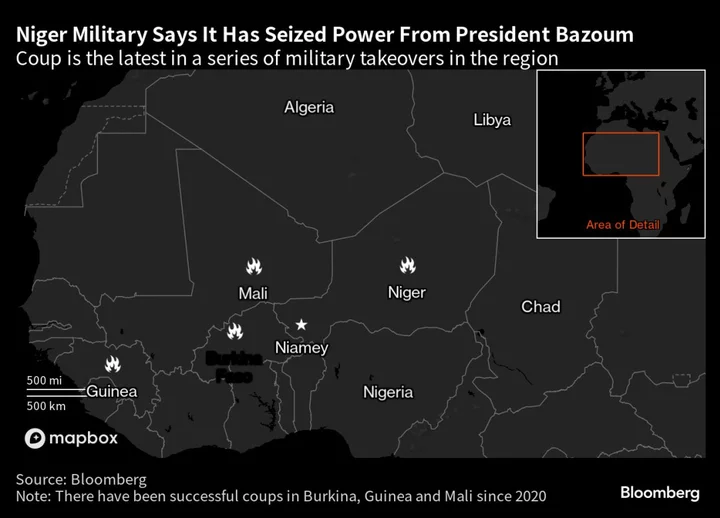
Niger Soldiers Claim Military Coup After President Is Detained
Soldiers in Niger claimed to have seized control of the West African nation after President Mohamed Bazoum was
2023-07-27 14:28

Banks tread tricky tightrope with politically exposed clients
By Sinead Cruise, Iain Withers and Lawrence White LONDON (Reuters) -The war of words between NatWest and erstwhile customer Nigel
2023-07-27 13:29
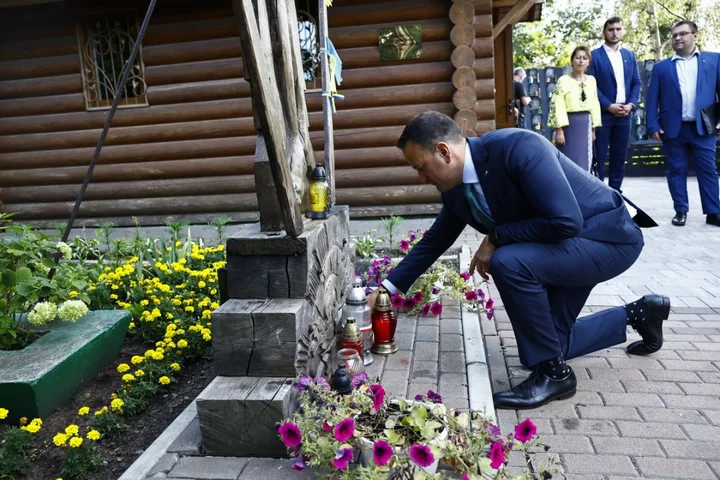
Ireland won’t offer condolences to Russia if Putin dies, Varadkar says
Taoiseach Leo Varadkar has said he does not think the Irish government would offer condolences to Russia in the event of Vladimir Putin’s death. Mr Varadkar was responding to a question relating to Ireland’s historical foreign policy. He said he did not believe an Irish delegation would be present at the Russian president’s funeral. The hypothetical situation relates to events almost 80 years ago. The Irish government adhered to a strict policy of neutrality throughout the Second World War. However, then-taoiseach and minister for external affairs Eamon de Valera sparked outrage among the international community when he expressed condolences to Germany’s Irish minister Eduard Hempel following Adolf Hitler’s death by suicide in 1945. The event caused significant reputational damage to Mr de Valera and the state, and is regarded as an important moment in the history of Irish neutrality. I wouldn’t imagine we’d be represented at the funeral Taoiseach Leo Varadkar The diplomatic conundrum was dragged into the 21st century this week at a post-Cabinet briefing with Mr Varadkar. While Ireland insists it continues to employ a policy of neutrality, senior government ministers say this relates to being militarily neutral rather than being politically neutral. Last week, Mr Varadkar pledged to stand with Ukraine for as long as it takes when he visited Ukrainian President Volodymyr Zelensky in Kyiv. He also announced millions of euro in additional funding for humanitarian aid to Ukraine. Following the trip, the taoiseach was questioned about Mr de Valera’s actions following the death of Hitler. Asked by reporters if Ireland would offer a similar condolence to Russia in the event of Mr Putin’s death, Mr Varadkar said: “I don’t think so.” Briefly pausing to consider the theoretical event, he added: “It’s a good question, I hadn’t thought of it before.” Mr Varadkar, who was banned from travelling to Russia last year, concluded: “I wouldn’t imagine we’d be represented at the funeral.” In November, the Kremlin said it was placing 52 “key representatives” from Ireland on a sanctions list for expressing what it claimed was Russophobic sentiment. Mr Varadkar was among the officials subjected to the ban by Russia. The Russian embassy in Dublin has been approached for comment. Read More Angry Russia refuses to speak at UN meeting on its attacks on Ukraine's key port city of Odesa. Putin ‘looked paralyzed and unable to act’ as Wagner coup unfolded Why are Wagner mercenaries in Belarus – and would they try to invade Poland? Charity boss speaks out over ‘traumatic’ encounter with royal aide Ukraine war’s heaviest fight rages in east - follow live
2023-07-27 13:29
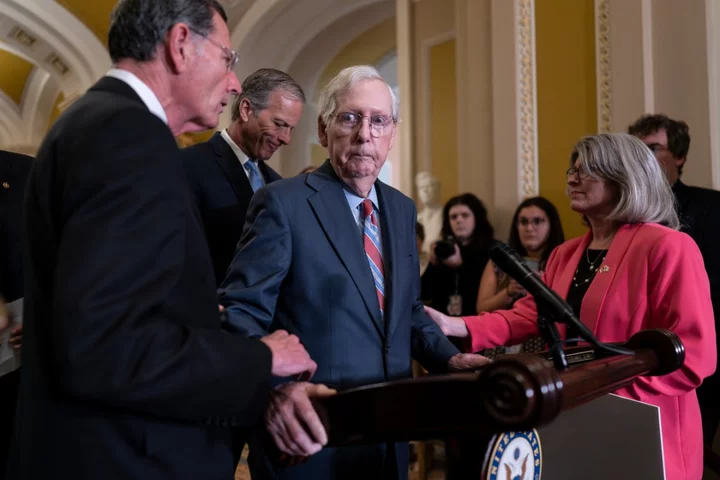
Mitch McConnell recently ‘fell in airport and was using wheelchair’ before press conference blackout
Senate minority leader Mitch McConnell reportedly tripped and fell while disembarking from a plane earlier this month before he abruptly froze mid-sentence during a news conference on Wednesday, according to reports. Mr McConnell fell from a plane at Ronald Reagan Washington National Airport on 14 July after the flight was cancelled and everyone had boarded the plane, two sources told NBC News. The 81-year-old has recently started using a wheelchair as a precaution while travelling in crowded places such as airports, a source said. A passenger who was in the same plane as Mr McConnel said he had a “face plant” and another passenger helped the Republican leader, according to the report. On Wednesday, he abruptly stopped while speaking during the weekly Republican leadership press conference and had to be led away by colleagues. The Kentucky senator stared vacantly for around 20 seconds before his colleagues who were standing behind him asked him if he wanted to return to his office. He did not respond but slowly walked back. He returned later to the conference and said he is “fine” and answered questions from the press. “The president called to check on me. I told him I got sandbagged,” he joked, in an apparent reference to a quote from Joe Biden in June he made after he tripped over a sandbag and fell while onstage at the US Air Force Academy graduation. A polio survivor as a child, Mr McConnel has long acknowledged some difficulty as an adult in climbing stairs. Mr McConnel was out of the Senate for almost six weeks after he sustained a concussion and fractured a rib when he fell and hit his head after a dinner event at a hotel earlier this year. He was hospitalised for several days. In 2019, he also tripped and fell at his home in Kentucky, causing a fracture in his shoulder and required surgery. “He’s definitely slower with his gait,” a Republican senator was quoted saying by NBC. They added that “he doesn’t address” his health issues even during closed-door meetings with GOP leaders. Read More Mitch McConnell leaves press conference abruptly after appearing unable to speak Trump news – live: Trump begs Congress to help save him from legal troubles as Jan 6 indictment decision looms North Korean leader Kim Jong Un meets with Russian defense minister on military cooperation Trump wants to see Biden impeached, and other Republicans are quick to pile on Mitch McConnell’s health history reveals previous issues after briefing freeze Mitch McConnell leaves press conference abruptly after appearing unable to speak
2023-07-27 13:28
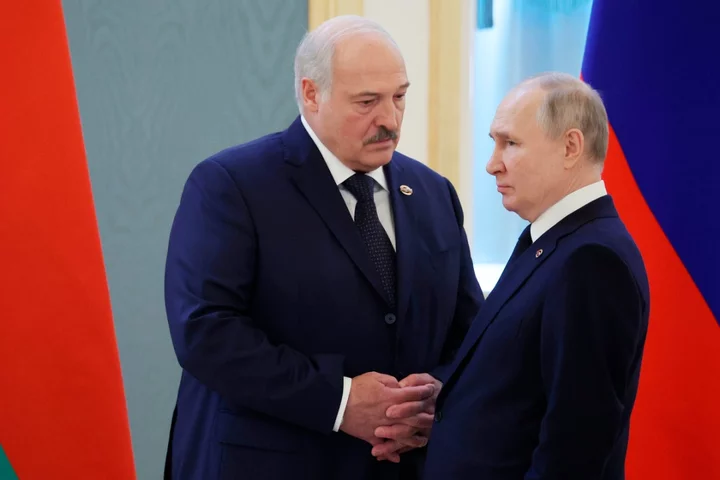
Bluffing or not, Putin’s declared deployment of nuclear weapons to Belarus ramps up saber-rattling
Sometime this summer, if President Vladimir Putin can be believed, Russia moved some of its short-range nuclear weapons into Belarus, closer to Ukraine and onto NATO's doorstep. The declared deployment of the Russian weapons on the territory of its neighbor and loyal ally marks a new stage in the Kremlin’s nuclear saber-rattling over its invasion of Ukraine and another bid to discourage the West from increasing military support to Kyiv. Neither Putin nor his Belarusian counterpart, Alexander Lukashenko, said how many were moved — only that Soviet-era facilities in the country were readied to accommodate them, and that Belarusian pilots and missile crews were trained to use them. The U.S. and NATO haven’t confirmed the move. NATO Secretary-General Jens Stoltenberg denounced Moscow’s rhetoric as “dangerous and reckless,” but said earlier this month the alliance hasn’t seen any change in Russia’s nuclear posture. While some experts doubt the claims by Putin and Lukashenko, others note that Western intelligence might be unable to monitor such movement. Earlier this month, CNN quoted U.S. intelligence officials as saying they had no reason to doubt Putin’s claim about the delivery of the first batch of the weapons to Belarus and noted it could be challenging for the U.S. to track them. Unlike nuclear-tipped intercontinental ballistic missiles that can destroy entire cities, tactical nuclear weapons for use against troops on the battlefield can have a yield as small as about 1 kiloton. The U.S. bomb in Hiroshima in World War II was 15 kilotons. The devices are compact: Used on bombs, missiles and artillery shells, they could be discreetly carried on a truck or plane. Aliaksandr Alesin, an independent Minsk-based military analyst, said the weapons use containers that emit no radiation and could have been flown into Belarus without Western intelligence seeing it. “They easily fit in a regular Il-76 transport plane,” Alesin said. “There are dozens of flights a day, and it’s very difficult to track down that special flight. The Americans could fail to monitor it.” Belarus has 25 underground facilities built during the Cold War for nuclear-tipped intermediate-range missiles that can withstand missile attacks, Alesin said. Only five or six such depots could actually store tactical nuclear weapons, he added, but the military operates at all of them to fool Western intelligence. Early in the war, Putin referenced his nuclear arsenal by vowing repeatedly to use “all means” necessary to protect Russia. He has toned down his statements recently, but a top lieutenant continues to dangle the prospect with terrifying ease. Dmitry Medvedev, the deputy head of Russia’s Security Council who served as a placeholder president in 2008-12 because Putin was term-limited, unleashes near-daily threats that Moscow won’t hesitate to use nuclear weapons. In a recent article, Medvedev said “the apocalypse isn’t just possible but quite likely,” and the only way to avoid it is to bow to Russian demands. The world faces a confrontation "far worse than during the Cuban missile crisis because our enemies have decided to really defeat Russia, the largest nuclear power,” he wrote. Many Western observers dismiss that as bluster. Putin seems to have dialed down his nuclear rhetoric after getting signals to do so from China, said Keir Giles, a Russia expert at Chatham House. “The evident Chinese displeasure did have an effect and may have been accompanied by private messaging to Russia,” Giles told The Associated Press. Moscow’s defense doctrine envisages a nuclear response to an atomic strike or even an attack with conventional weapons that “threaten the very existence of the Russian state.” That vague wording has led some Russian experts to urge the Kremlin to spell out those conditions in more detail and force the West to take the warnings more seriously. “The possibility of using nuclear weapons in the current conflict mustn’t be concealed,” said Dmitry Trenin, who headed the Moscow Carnegie Center for 14 years before joining Moscow’s state-funded Institute for World Economy and International Relations. “The real, not theoretical, perspective of it should create stimuli for stopping the escalation of the war and eventually set the stage for a strategic balance in Europe that would be acceptable to us,” he wrote recently. Western beliefs that Putin is bluffing about using nuclear weapons “is an extremely dangerous delusion,” Trenin said. Sergei Karaganov, a top Russian foreign affairs expert who advises Putin’s Security Council, said Moscow should make its nuclear threats more specific in order to “break the will of the West” and force it to stop supporting Ukraine as it seeks to reclaim Russian-held areas in a grinding counteroffensive. “It’s necessary to restore the fear of nuclear escalation; otherwise mankind is doomed,” he said, suggesting Russia establish a “ladder" of accelerating actions. Deploying nuclear weapons in Belarus was the first step, Karaganov said, with perhaps a follow-up of warning ethnic Russians in countries supporting Ukraine to evacuate areas near facilities that could be nuclear targets. If that doesn’t work, Karaganov suggested a Russian nuclear strike on Poland, alleging Washington wouldn’t dare respond in kind to protect a NATO ally, for fear of igniting a global war. “If we build the right strategy of intimidation and even the use of it, the risk of a retaliatory nuclear or any other strike on our territory could be reduced to a minimum,” he said. “Only if a madman who hates his own country sits in the White House would America risk to launch a strike ‘in the defense’ of the Europeans and draw a response, sacrificing Boston for Poznan.” The Moscow-based Council of Foreign and Defense Policies, a panel of leading military and foreign policy experts that includes Karaganov, denounced his comments as “a direct threat to all of mankind.” While pro-Kremlin analysts floated such scenarios, Lukashenko, the Belarusian leader, says hosting Russian nuclear weapons in his country is meant to deter aggression by Poland. He claimed a number of nuclear weapons were flown to Belarus without Western intelligence noticing, with the rest coming later this year. Officials in Moscow and Minsk said the warheads could be carried by Belarusian Su-25 ground attack jets or fitted to short-range Iskander missiles. Giles, of Chatham House, said the deployment was about “cementing Putin’s control over Belarus” and did not offer Moscow any military advantage over placing them in Russia’s Baltic exclave of Kaliningrad that borders Poland and Lithuania. The West should recognize this as a ploy "that has far more to do with Russia’s ambitions for Belarus than any genuine impact on European security beyond that,” Giles said. Some observers question whether the deployment to Belarus has even happened. Miles Pomper, a senior fellow at the James Martin Center for Nonproliferation Studies at the Middlebury Institute, challenged Lukashenko’s claim that nuclear weapons were covertly flown to Belarus. They are normally moved by rail, he said, and there are no signs of "the support elements that you would see that would go with shipments of weapons.” Others note Russia could have deployed the weapons without adhering to protocols used in the 1990s, when Moscow wanted to show the West its nuclear arsenal was secure amid economic and political turmoil. Belarusian military analyst Valery Karbalevich said keeping such details secret could be a Kremlin strategy of "applying permanent pressure and blackmailing Ukraine and the West. The unknown scares more than certainty.” Alesin, the Minsk-based analyst, argued that U.S. and NATO may play down the deployment of nuclear weapons to Belarus because they pose a threat the West finds difficult to counter. “The Belarusian nuclear balcony will hang over a large part of Europe. But they prefer to pretend that there is no threat, and the Kremlin is just trying to scare the West,” he said. If Putin decides to use nuclear weapons, he may do it from Belarus in hopes that a Western response would target that country instead of Russia, Alesin said. The political opposition to Lukashenko warns that such a deployment turns Belarus into a hostage of the Kremlin. While Lukashenko sees such weapons as a “nuclear umbrella" protecting the country, "they turn Belarus into a target,” said exiled opposition leader Sviatlana Tsikhanouskaya, who tried to unseat the authoritarian leader in a 2020 election widely viewed as fraudulent. “We are telling the world that preventative measures, political pressure and sanctions are needed to resist the deployment of nuclear weapons to Belarus," she said. "Regrettably, we haven’t seen a strong Western reaction yet.” ___ Yuras Karmanau in Tallinn, Estonia, Jill Lawless in London and Ellen Knickmeyer in Washington contributed. ___ The Associated Press receives support for nuclear security coverage from the Carnegie Corporation of New York and Outrider Foundation. The AP is solely responsible for all content. ___ Follow AP's coverage of the war in Ukraine at https://apnews.com/hub/russia-ukraine Read More Ukraine war’s heaviest fight rages in east - follow live Charity boss speaks out over ‘traumatic’ encounter with royal aide Ireland won’t offer condolences to Russia if Putin dies, Varadkar says Ireland unlikely to offer condolences to Russia if Putin dies, Varadkar says Angry Russia refuses to speak at UN meeting on its attacks on Ukraine's key port city of Odesa.
2023-07-27 13:22
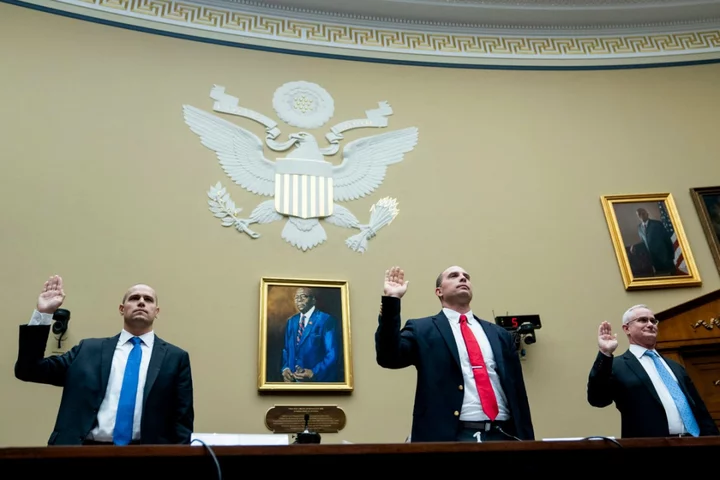
Explosive claims, impossible craft and questions of ‘murder’: House UFO hearing probes alleged alien technology defying laws of physics
Aliens and UFOs were the topic du jour in Washington DC as the House Subcommittee on National Defense met to hear testimony from three men — two Navy pilots and one former intelligence officer — who are warning that the skies may not be as safe as Americans previously thought. While the hearing was not specifically probing whether or not aliens have visited Earth — instead being ostensibly focused on the alleged prevalence of unidentified aerial objects over US skies — the discussion of extraterrestrials and "non-human biologics" no less permeated the discussion. The three men who sat before the subcommittee were David Grusch, a former intelligence officer in the Air Force and National Geospatial Intelligence Agency; former Navy pilot Ryan Graves, who claims to have encountered UAPs during missions; and David Fravor, another Navy pilot, who recorded the infamous "Tic Tac" UAP video in 2004. The witnesses agreed that the US is lacking in a proper reporting system for UAP sightings, with Mr Graves noting that both military and commercial pilots who claim to have encountered the craft feel as though they cannot report the sightings without suffering stigma and potential career retaliation. The witnesses Mr Graves was most concerned with the dearth of reporting options for pilots who encounter the supposed craft. He had his own experience in 2014, when a squadron under his command encountered "dark grey or black cubes ... inside of a clear sphere, where the apex or tips of the cubs were touching the inside of that sphere" approximately 10 miles off the coast of Virginia Beach. He said his pilots described the craft performing impossible aerial maneuvers that he said would kill a human and were far beyond the capability of any known technology. Mr Graves further stated that such encounters were "not rare, or isolated" and that there was no official means of reporting such encounters. "If everyone could see the sensor and video data I witnessed, our national conversation would change," Mr Graves said in his opening statement. "I urge us to put aside stigma and address the security and safety issue this topic represents. If UAP are foreign drones, it is an urgent national security problem. If it is something else, it is an issue for science. In either case, unidentified objects are a concern for flight safety. The American people deserve to know what is happening in our skies. It is long overdue." Mr Fravor offered an account of his 2004 incident off the coast of San Diego, during which he said he encountered a "smooth" white object he likened to a tic tac mint or a propane tank. He said he spotted it hovering over the water before it rapidly ascended, accelerated, and disappeared. He noted that there was white water beneath the craft — suggesting something may have been under the water — and that the white water was gone after it disappeared. "I think what we experienced was, like I said, well beyond the material science and the capabilities that we had at the time, that we have currently or that we're going to have in the next 10 to 20 years," Mr Fravor said. The "Tic Tac video" was featured in a 2017 New York Times article discussing UAPs written by the same individuals who first reported on Mr Grusch's whistleblower claims. Both pilots agreed that the UAPs they encountered represented national security threats to the United States. Mr Grusch, who spent 14 years working as an intelligence officer, offered the most fantastic of the claims during the hearing, but provided the least evidence of any of the witnesses. He said he decided to blow the whistle on the US government after learning from another individual that the US has retrieved wreckage from UAPs and is currently reverse-engineering the technology. “I was informed in the course of my official duties of a multi-decade UAP crash retrieval and reverse engineering program to which I was denied access,” he said. He further claimed that a UAP the size of a football field has been concealed somewhere, and that "non-human biologics" were found piloting some of the crashed UAPs. Mr Grusch has made clear that he was not a personal witness to any of what he claims, but is repeating what he was told by individuals he deems as credible. The Pentagon has denied his claims of a coverup. Sue Gough, a Defense Department spokesperson, said investigators have not found “any verifiable information to substantiate claims that any programs regarding the possession or reverse-engineering of extraterrestrial materials have existed in the past or exist currently.” The statement did not address the recovery of craft not suspected of being extraterrestrial in nature. During the hearing, Congressman Tim Burchett asked Mr Grusch if he was aware of anyone who had been harmed in the interest of the US government maintaining secrecy about the alleged crashed UAPs. "Do you have any personal knowledge of people who have been harmed or injured in efforts to cover-up or conceal these extra-terrestrial technologies," he asked. “Yes. Personally,” he replied. Mr Burchett then asked, "has anyone been murdered?" Mr Grusch hesitated for a moment. "I have to be careful asking [sic] that question," he said, citing a current investigation into whether or not he was the subject of retaliatory action for whistleblowing. "I directed people with that knowledge to the appropriate authorities." He further went on to claim that he was aware of planned retaliation efforts against him by his former superiors in the US government, and that he was aware of unsanctioned "IRAD" programs in which government contractors were overcharging American government buyers and using the excess profit to funnel into DOD research programs. Lines for the hearing stretched far down the hall, with UFO enthusiasts mixing alongisde the media in hopes of witnessing "disclosure" — the long-awaited acknowledgment by the US government that we are not alone in the universe. However, they were left with only a tease of information; each time Mr Grusch was asked to provide specific information — details about the IRAD programs, the locations of supposed crashed UAPs, specifics about the "non-human" entities allegedly found with the wreckage — he assured the Congressional leaders that he knew the answers, but could not provide them publicly. He said he could provide specific information only in a closed session or in a secure environment, citing confidentiality concerns. Congressional questions The bipartisan subcommittee expressed appreciation for the witnesses' testimonies and broadly operated from the position that the government was withholding information concerning the true nature of UAPs — whether they are controlled by foreign adversaries, aliens, or something else entirely — and several members assured the witnesses they would be protected for possible retaliation. While Mr Graves and Mr Fravor said they did not experience blowback for their reports, Mr Grusch claimed he had, prompting Congressman Jamie Raskin to ask for details about his experiences. He said he was aware of "active planned reprisal" coming from "leadership at my previous organisation," and said he referred to the retaliation as "administrative terrorism." Congresswoman Alexandria Ocasio-Cortez centred her questioning on Mr Grusch's claims concerning independent research and development — IRAD — programs funneling money from American government buyers into "unsanctioned" DOD programs. Earlier in his testimony, Mr Grusch told Congressman Jared Moskowitz he was aware of IRADs funding "unsanctioned" development of "advanced technology." Ms Ocasio-Cortez said she had seen IRAD programs and regulations requiring agencies initiating research to notify oversight bodies abused, and asked "if you were me, where would you look" to find evidence for the claims that government contract money was being siphoned to unrelated research and development. Mr Grush said he would be happy to provide the details "in a closed environment" and said he could tell her "specifically." Congresswoman Nancy Mace zeroed in on what many of the attendees were likely hoping to hear addressed; the existence of aliens. “Do you believe our government has made contact with intelligence extraterrestrials,” she asked. Mr Grusch said it was “something I can’t discuss in a public setting,” resulting in a curious eyebrow raise from longtime UFO researcher, reporter, and occasional Coast to Coast AM guest host George Knapp, who was seated behind Mr Grusch. Ms Mace continued, asking “if you believe we have crashed craft ... do we have the bodies of the pilots who piloted [these] craft?” “As I’ve stated publicly already in my NewsNation interview, biologics came with some of these recoveries, yeah.” She then asked if they were “human or non-human biologics?” “Non-human, and that was the assessment of people with direct knowledge on the program I talked to, [who] are still on the program,” he said. Ms Mace then asked if any evidence — photo, video, eyewitnesses — of such creatures existed. “The specific documentation I would have to talk to you in a SCIF about,” he replied. Congressman Glenn Grothman, who chaired the subcommittee, said he anticipated legislation would come out of continued, closed-door discussions with the witnesses. "Several of us are going to look forward to getting some answers in a more confidential setting," he said. "I assume some legislation will come out of this." Read More Congressman asks UFO whistleblower if anyone has been ‘murdered’ to maintain alleged coverup Tom DeLonge left Blink-182 for an alien adventure. Now back on tour, his UFO mission is taking off in Congress Republican lawmaker claims US is ‘hiding evidence’ of UFOs which ‘defy physics as we know it’ Watch: Congress holds hearing on UFOs What to expect from the House committee hearing looking into UFOs Biden looks to provide relief from extreme heat as record temperatures persist
2023-07-27 12:57
